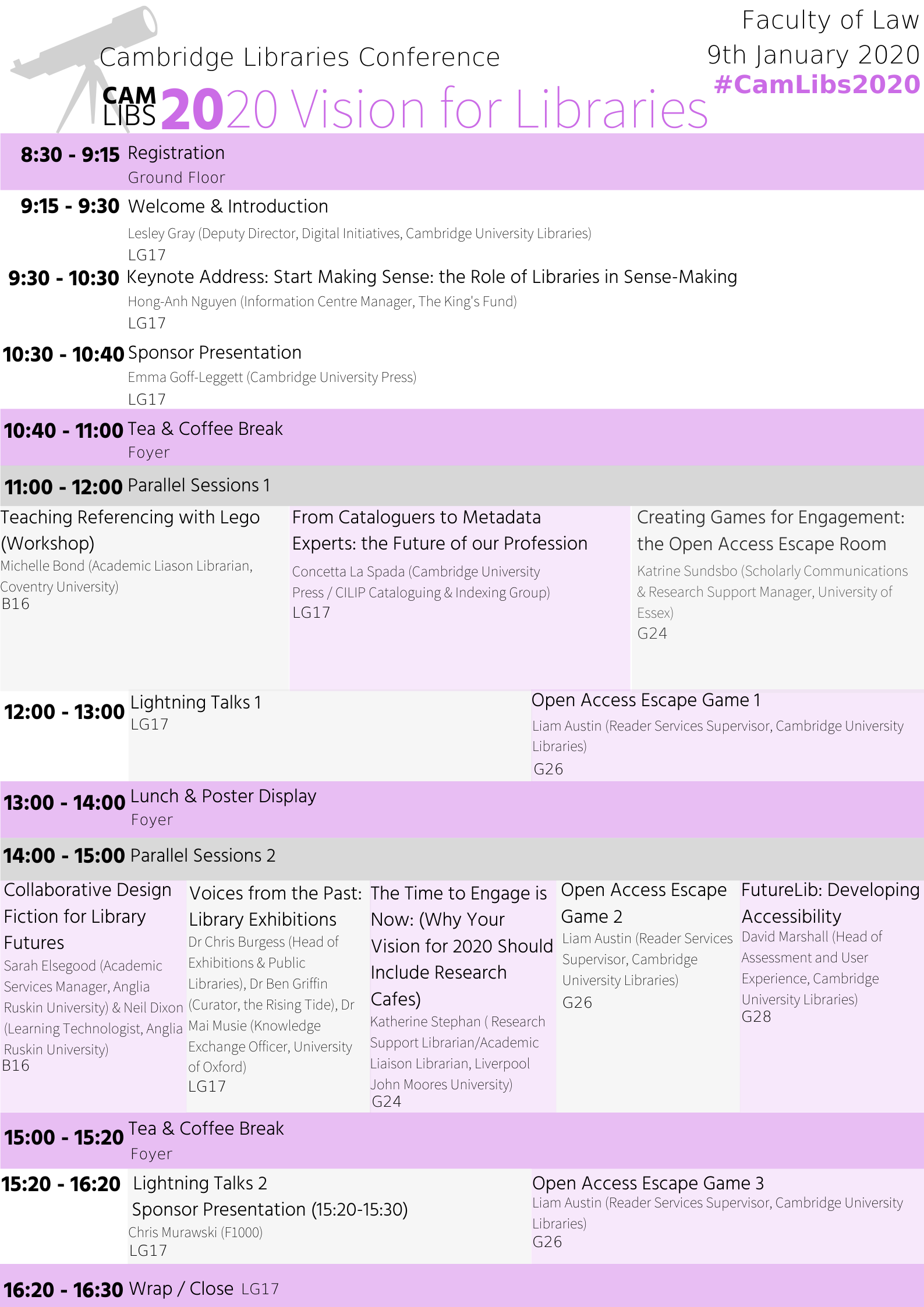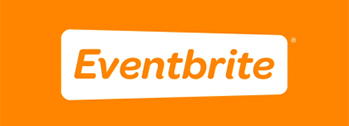Click on this link to download a copy of the above timetable.
For full details of the sessions, please see the programme below.
|
08:30-09:15 |
Registration |
|
09:15-09:30 |
Morning Session Lesley Gray (Deputy Director, Digital Initiatives, Cambridge University Libraries) |
|
09:30-10:30 |
Keynote Address : Start Making Sense: the Role of Libraries in Sense-Making Hong-Anh Nguyen (Information Centre Manager, The King's Fund) In an era of fake news, CILIP’s #FactsMatter campaign and a society reshaped by our interaction with technology, what does that mean for the future of libraries and the role of librarians? What happens to the gatekeeper when the gates are more open than ever? Hong-Anh Nguyen, Information Service Manager at health think tank The King’s Fund, will discuss how the library service has gone from behind the scenes research support to taking a more proactive role in contributing to the Fund’s sense-making and explainer work. |
| 10:30-10:40 | Sponsor presentation: Cambridge University Press |
|
10:40-11:00 |
Tea/Coffee |
|
11:00-12:00 |
Parallel Sessions 1 |
|
|
1: Teaching Referencing with Lego (Workshop) Michelle Bond (Academic Liaison Librarian, Coverntry University) SCONUL’s 7 Pillars (SCONUL, 2011) recognises the use of suitable referencing styles as a key part of information literacy. It’s essential to academic life but perhaps one of the most boring things to teach and be taught. Enter Lego. This workshop showcases how the use of Lego can make for a more interesting and memorable referencing session. It builds on work done at Southampton Solent (Buckley, 2015a and Buckley, 2015b) and Leeds (Wheeler, 2017) Universities, where Lego has been used to reinforce learning at the start and end of sessions. In the class I will show how using both this technique and a further task where the students build and explain metaphorical models can make for a fun and engaging session for students. Participants in the workshop will have the opportunity to experience a section of the Lego workshop usually run with students – including the chance to build their own Lego models! The workshop will also include time for critical discussion about the use of Lego and the opportunity to consider how participants might use Lego within their own teaching environments. |
|
|
2: Creating Games for Engagement: the Open Access Escape Room Katrine Sundsbø (Scholarly Communications and Research Support Manager, University of Essex) The Open Access Escape Room was created just before the 2018 Open Access Week, as a creative and fun way of engaging staff, students and researchers with open access. This talk by the creator of the Open Access Escape Room will explain the idea behind the game, how it was created and how it has been received. There will be a discussion around games, creativity and engagement, and time for questions. NB! This session will not contain any spoilers about the game or puzzles in the game. |
|
|
3: From Cataloguers to Metadata Experts : the Future of our Profession Concetta La Spada (Cambridge University Press/CILIP Cataloguing and Indexing Group) If in the beginning cataloguing had a definite place in the library hierarchy, things are changing now. Teams are cut, and cataloguing duties are added to others. While this is happening in the library sector, on the “other side” more publishers and vendors have realised that they need metadata experts in their teams in order to supply better quality metadata and better collaborate with librarians. And to be metadata experts librarians have to have new data skills, skills that at the moment are not taught within library studies curricula. What is to be expected for the future of cataloguers and metadata experts? Come and join the discussion and also, discover the findings of recent events and workshops held by the Cataloguing and Indexing Group (Metadata and Discovery Group). |
|
12:00-13:00 |
Lightning Talks 1 |
| 12:00-13:00 |
Open Access Escape Game 1 Liam Austin (Reader Services Supervisor, Cambridge University Libraries) Your chance to try the Cambridge Open Access Escape Game in practice. Booking for this session will be available on the day. NB: this session will run at the same time as lightning talk session 1. |
|
13:00-14:00 |
Lunch + Poster Display |
|
14:00-15.00 |
Parallel Sessions 2 |
|
|
5. Collaborative Design Fiction for Library Futures Sarah Elsegood (Academic Services Manager, Anglia Ruskin University) and Neil Dixon (Learning Technologist, Anglia Ruskin University) Design fiction is a method of using ‘fantasy prototypes’ in plausible near futures (Rapp, 2019) to facilitate higher levels of creativity when designing new products or technologies. In this interactive workshop participants will be focusing in groups on one or two familiar technologies currently in use in our libraries, to construct fictional user accounts of a potential technological eco-system in the age of Education 4.0. |
|
6. Voices from the Past: Library Exhibitions Dr. Chris Burgess (Head of Exhibitions and Public Engagement, Cambridge University Library), Dr Ben Griffin (Curator, The Rising Tide), Mai Musie (Knowledge Exchange Officer, University of Oxford) Books and manuscripts in exhibition cases are challenging. Without the ability to touch, to open, to examine more than a single page, we witness a transformation; book-as-library. Vast, enticing, but seemingly impossible to grasp. The exhibition visitor is readers poor relation. Given the limitations of displaying books, what point the library exhibition? This talk will suggest that exhibitions offers the opportunity to treat library collections anew. Manuscripts can be displayed within multiple contexts, breathing new meanings into long held texts. The library exhibition is perhaps in a unique position to show that the past is owned by all of us, and visitors have an opportunity to walk through the layers of history. If we tell the right stories exhibitions provide a point from which visitors can be interested, moved, and inspired. To achieve this, I will suggest exhibitions must present collections in contexts to which visitors can relate, and designed in such a way as to ensure that the thrill of the encounter with the original document remains. |
|
|
7. The Time to Engage is Now: (Why Your Vision for 2020 Should Include Research Cafes) Katherine Stephan (Research Support Librarian/Academic Liaison Librarian, Liverpool John Moores University) Research cafes started at Liverpool John Moores University around seven years ago as a way to share research with a wider audience, in an informal way. My talk will discuss their evolution from lunchtime discussions to one-off events to linking up with other universities and discussing the opportunities and challenges running them brings. My aim is for attendees to feel inspired to bring research out/engage with a wider community, in big or small ways, within the time they can. |
|
|
8. FutureLib: Developing the Accessibility and Inclusivity of Cambridge Library Services David Marshall (Head of Assessment and User Experience, Cambridge University Libraries) This talk will introduce a project conducted by Cambridge University Libraries’ Futurelib programme, aiming to uncover insights that could be used to increase the accessibility and inclusivity of library services at Cambridge. Conducted October 2018 to March 2019, the project involved scoping research with peer institutions and collaboration with key organisations within the University of Cambridge, as well as a concentrated period of in-depth research with disabled students.
The presentation will cover methods used during the project, including an online survey, digital student diary study and in-depth semi-structured interviews. It will introduce key findings from the project and resulting recommendations for strategic focus and operational changes at Cambridge University Libraries. Outputs and next steps from the project will be discussed and there will be an opportunity for attendees to reflect on potential implications of the project’s findings for their own library service.
|
|
|
Open Access Escape Game 2 Liam Austin (Reader Services Supervisor, Cambridge University Libraries) Your chance to try the Cambridge Open Access Escape Game in practice. Booking for this session will be available on the day. NB: this session will run at the same time as parallel sessions 2. |
|
|
15:00-15:20 |
Tea/Coffee |
|
15:20-16:20 |
Lightning Talks 2 (including Sponsor Presentation: F1000) |
| 15:20-16.20 |
Open Access Escape Game 3 Liam Austin (Reader Services Supervisor, Cambridge University Libraries) Your chance to try the Cambridge Open Access Escape Game in practice. Booking for this session will be available on the day. NB: this session will run at the same time as lightning talk session 2. |
| 16:20-16:30 | Wrap up / Close |







